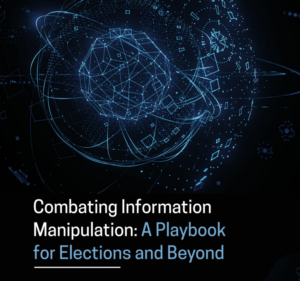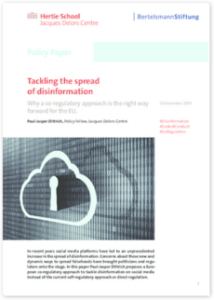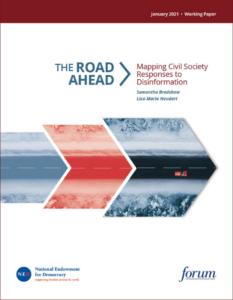Misinformation is about to get worse, says former Google CEO Eric Schmidt. Many people believe that the lying in misinformation on social media should be prohibited, but he doesn’t know how to do so in a systematic way, he tells the Atlantic.
And the people who are spreading misinformation will get access to tools that will make it even easier for them. The industry has got to figure out a way to stop the spread of misinformation, Schmidt argues:
One of them, by the way, just to digress technically, is that the information is not watermarked in such a way that we know its origin. It will be relatively easy for the industry as a whole to start by saying, “Where did this information actually come from? Where did this picture or this text or video or whatever—where did it enter all of our systems, and then who modified it?” That alone would help us at least understand the source of the manipulation.
 A Facebook algorithm is responsible for pushing misinformation onto users, according to Frances Haugen, a former product manager on the company’s civic misinformation team. Facebook recognized the risk of misinformation to the 2020 election and added safety systems to reduce that risk. But the company loosened those safety measures once again after the election, she said.
A Facebook algorithm is responsible for pushing misinformation onto users, according to Frances Haugen, a former product manager on the company’s civic misinformation team. Facebook recognized the risk of misinformation to the 2020 election and added safety systems to reduce that risk. But the company loosened those safety measures once again after the election, she said.
“As soon as the election was over, they turned them back off or they changed the settings back to what they were before, to prioritize growth over safety,” Haugen said. “And that really feels like a betrayal of democracy to me.”
As a product manager in Facebook’s civic integrity team, she addressed election interference around the world, the Guardian adds.
“When we live in an information environment that is full of angry, hateful, polarizing content, it erodes our civic trust, it erodes our faith in each other, it erodes our ability to want to care for each other,” Haugen said. “The version of Facebook that exists today is tearing our societies apart and causing ethnic violence around the world.”
 The Kremlin employs disinformation operations to weaken its competitors overseas, to maintain influence in its own neighborhood, and to keep President Putin in power, the Bertelsmann Foundation notes. In its latest animation (above), the Foundation and the Alliance for Securing Democracy shine a spotlight on the Lugar Research Center in Tblisi, Georgia, as a case study in how Russian disinformation works, and its capacity to undermine trust in government, institutions and the transatlantic alliance.
The Kremlin employs disinformation operations to weaken its competitors overseas, to maintain influence in its own neighborhood, and to keep President Putin in power, the Bertelsmann Foundation notes. In its latest animation (above), the Foundation and the Alliance for Securing Democracy shine a spotlight on the Lugar Research Center in Tblisi, Georgia, as a case study in how Russian disinformation works, and its capacity to undermine trust in government, institutions and the transatlantic alliance.
Spain’s premier independent fact-checking organization Maldita.es realized long ago that most of the disinformation we debunk starts in private messaging apps, before overflowing to open platforms such as YouTube, Facebook or any of the others, says Carlos Hernández-Echevarría. And more importantly, we already knew that the sooner a hoax is debunked, the smaller the scope of its dissemination is, he writes in a contribution to the Heinrich Boll Stiftung’s ‘Drowning in disinformation‘ dossier, which explores how state-sponsored disinformation threatens democracy.
 Civil society organizations (CSOs) play a central role in addressing disinformation’s growing impact on democracy, according to a recent analysis, “The Road Ahead: Mapping Civil Society Responses to Disinformation.” The report, authored by Samantha Bradshaw and Lisa-Maria Neudert, is a working paper produced by the National Endowment for Democracy’s International Forum for Democratic Studies.
Civil society organizations (CSOs) play a central role in addressing disinformation’s growing impact on democracy, according to a recent analysis, “The Road Ahead: Mapping Civil Society Responses to Disinformation.” The report, authored by Samantha Bradshaw and Lisa-Maria Neudert, is a working paper produced by the National Endowment for Democracy’s International Forum for Democratic Studies.
This publication is part of an International Forum working paper series, examining the dynamics and impact of resurgent authoritarian influence in the era of globalization,
A forthcoming discussion, hosted by the Financial Times in partnership with Adobe, addresses the significant problem of deceptive and manipulated content online, focusing on how public-private partnerships, consciousness-raising, and industry efforts like the Content Authenticity Initiative (CAI) can help repair and preserve trust on the internet.
COMBATTING DISINFORMATION ON DIGITAL PLATFORMS
Thursday 14 October | 17:00 – 18:00 BST | 09:00 – 10:00 PST | #FTDigitalDialogues #FTTech
Free to join: combattingdisinformation.live.ft.com
Explore the agenda, view the outstanding speaker line-up and grab your complimentary ticket now here.







